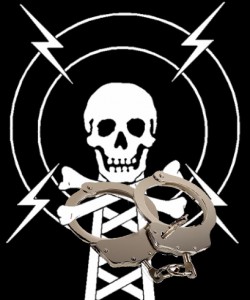Apparently looking to follow the example set by New Jersey and Florida, New York state senate bill S2737-2011 is intended to create “the crime of unauthorized radio transmission, a class D felony, punishable by imprisonment and a fine in the amount of not less than $10,000.00.” Thanks go to John Anderson at DIYmedia.net and Paul Thurst at Engineering Radio for first making me aware of this legislation.
As John points out, New York City is a hotbed for unlicensed broadcasters, with the state edging out Florida for the first time for the greatest number of FCC enforcement actions in 2010. This does not necessarily mean, however, that New York has more pirate stations than any other state, just that there were more FCC actions there. Certainly we can infer that there are many pirate stations prompting the action, but Commission enforcement also is often cyclical and some offices seem to be more interested in going after pirates than other. It does appear that complaints from licensed broadcasters may contribute to an uptick in enforcement.
Radio-info reports that lawmakers are motivated not just by interference complaints but allegations that stations are connected to criminal activity. WVOX/WVIP, New Rochelle owner Bill O’Shaughnessy is quoted claiming that “thugs” in a black Cadillac Escalade pulled up alongside an FCC agent’s car and warned, “‘I don’t think you want to go in there.” The article doesn’t explain how O’Shaughnessy comes to know or verify this colorful story.
This is a similar line of reasoning used to justify the anti-pirate law in Florida, as well as other enforcement campaigns in places like London, England and Israel. Of course, the argument begs the question as to why can’t the authorities target the supposed crimes that are already illegal?
As I reported last July, there are no reports of anyone going to jail for unlicensed broadcasting in either New Jersey or Florida, although there have been sporadic accounts of arrests in Florida. You’d think that with all the hoopla in Florida, in particular, if there was a conviction with any kind of jail time the local authorities would trumpet it to the local press. However, the last conviction appears to be in 1999, and that is under federal statute, not state. Therefore, I don’t think we can reasonably conclude that Florida’s anti-pirate law is doing much curb crime in that state, so much as giving police one more crime to enforce.
Should the New York bill pass I doubt we’ll see much change in either the unlicensed radio landscape or crime stats in that state. I think we can expect to see a few well-publicized arrests right off the bat, probably low-hanging fruit. And then things will quiet down and those frequencies will become occupied by another broadcaster serving up programming that fills a void not served by a licensed station.




